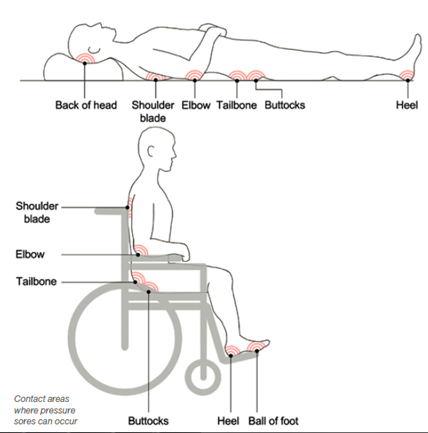 Key Points
Key Points
- You may need to assist in managing your loved one’s medication. It is important to ensure that they are taken as prescribed.
- Learning first aid may prove useful, especially if your loved one is prone to injury.
- There are many ways to prevent pressure sores, including assisting your loved one to change their positions regularly.
- Preventing infections starts with maintaining a clean home environment, washing hands and wearing gloves.
Depending on their disability, your loved one may have co-existing medical conditions or be more likely to face health-related issues. Attending regular medical appointments and health check-ups can help you and your loved one know what to expect and better manage their needs. You may need to assist them in the following areas:
- Medication Management
You can help your loved one manage their medications, by setting medication reminders, creating a medication list and packing their pill boxes. Applications such as National University Hospital’s myMeds can also assist you and your loved one in this.
If your loved one has1:
- Visual impairment: You can ask for or create medicine labels that are printed in bigger fonts, have better colour contrast or add tactile markers. You can also use auditory medication reminders such as alarms.
- Physical disability: You can request for the medicine to be provided in a manner that enables your loved one to consume it independently (e.g. blister pack, or a pillbox that can be opened easily) or repack their medicine in labelled containers that are easier to open.
- Swallowing difficulties: You can get medication in different forms (e.g. liquids or dissolvable tablets instead of pills). Where needed, ask your doctor or pharmacist if you may mix their medication in their food or drink.
Check out more tips here.
- First Aid
First aid is helpful in medical emergencies, such as when your loved one suffers burns, wounds, sprains or choking. Learn first aid skills so that you can render proper first aid on-site before medical help arrives. You can dial 995 for emergencies and 1777 for a non-emergency ambulance. It is also advisable to have a first aid kit at home and regularly replace any expired items.
- Preventing Pressure Sores
Pressure sores may develop if your loved one sits in a wheelchair or lies on a bed for long periods of time without a change in position. Pressure sores can develop gradually over time. Here are some tips to prevent them:
- Help your loved one change their position every two hours. Aids like wedge cushions can be used to help maintain your loved one on their side on a bed2.

Your loved one’s sleeping position should be changed every two hours, alternating between sleeping on their side and on their back. You may also adjust the angle of their beds.
- Keep their skin clean and dry3.
- Recognise signs of pressure sores.

Common contact areas where pressure sores may develop include the back of head, shoulder blade, elbow, tailbone, buttocks, heel and ball of foot.
- Perform basic pressure sore management when needed.
- Seek assistance from medical professionals if the pressure wound continues to deepen, such that their muscle, tendon or even bones start to be exposed4.
- Infection Control
Given that your loved one may be more vulnerable to health risks, it is important to reduce their risk of infections (including bacterial, viral and fungal). Infection can spread in various ways, such as coming into contact with other infected people, touching an object that an infected person has also touched, inhaling airborne particles or droplets and transferring of bodily fluids5.
You can help prevent infections by:
- Maintaining a clean home environment.
- Washing hands thoroughly with soap and proper techniques after touching blood, body fluids, waste or objects contaminated with these substances.
- Wearing surgical gloves, especially when performing care routines that may expose you to body fluids, blood, waste, wounds or any objects that may have been contaminated with them.
- Keeping your loved one up to date on vaccinations. Where necessary, you can help your loved one prepare for vaccination appointments through the use of social stories.
Besides taking these preventive measures, you can enroll in training courses to learn specific skills such as basic wound management.
 Actions to take
Actions to take
- Maintain the cleanliness of your home.
- Wash your hands frequently and practice the eight steps of handwashing.
- Wear surgical gloves to prevent contamination.
- Assist your loved one in caring for their wounds.
- Keep your loved one up to date on vaccinations.
- Encourage your loved one to consume prescribed medications.
 Resources
Resources